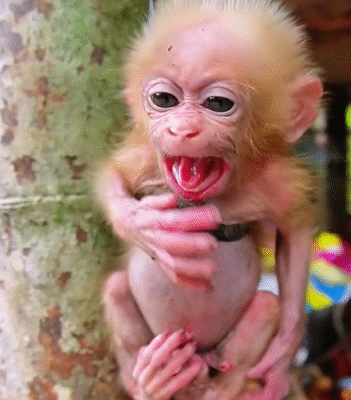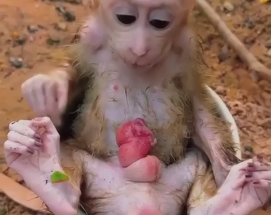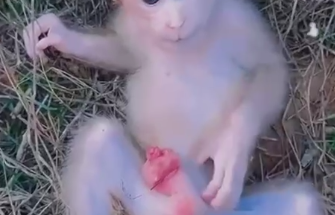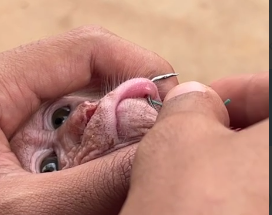The morning mist still clung to the forest floor when the white NGO rescue van rumbled gently up the narrow dirt path. Inside the van, wrapped in a soft blanket and clinging tightly to a plush toy, was a small baby monkey named Kalu.
Kalu had been rescued nearly two months earlier after he was found injured and alone near a broken tree branch in a nearby village. Locals said they had heard cries for hours before anyone found him, lying helpless at the edge of the forest.
He was bruised, thin, and terrified — a tiny, trembling bundle of fur. It was clear that he had fallen or had been separated from his troop. There was no sign of his mother, but the forest was thick and wild, and there was always hope.
The rescue team from Wild Paws Foundation, a small but dedicated NGO, rushed him to their rehabilitation center. There, he was treated for internal bruising, dehydration, and stress. For weeks, he clung to his human caretakers — drinking milk from a syringe, wrapping his tiny fingers around their hands, and crying softly in the night.
But Kalu was a fighter.
With love, food, and care, he began to heal. His eyes brightened. His energy returned. And with time, he even began playing again — climbing small ropes and chasing butterflies in the sanctuary’s outdoor enclosure.
Then, the day everyone had hoped for came.
The Plan to Reunite
The field team had found Kalu’s original troop — or so they believed. Hidden cameras had captured a small monkey troop not far from where Kalu had been found. Among them was a female monkey who seemed to constantly search the trees and call out in distress. The team suspected she was Kalu’s mother.
“She still calls for a baby,” said Ravi, one of the field researchers. “She looks lost. If there’s a chance she’ll take him back… we have to try.”
Dr. Priya, the wildlife vet, agreed. “He’s strong enough now. We have to let nature decide.”
So, after nearly two months of treatment and recovery, Kalu was gently placed into a soft carrier, and the team began their journey back to the forest.
Inside the van, Kalu was quiet — as though he sensed something was about to change.
The Reunion Attempt
The release site was quiet, deep in the forest. The trees were tall, and the air was thick with birdsong. Perched on branches just a few meters away was the troop — and among them, the mother monkey they believed was Kalu’s.
As the team opened the carrier door, Kalu peered out cautiously. His eyes scanned the trees — and then, he saw her.
The female monkey stopped. She looked down. Her body stiffened.
Kalu stepped out slowly, making soft chirping sounds — sounds baby monkeys make when calling for their mothers.
The mother watched. She shifted, alert but hesitant. Kalu reached up toward her tree, calling again, inching forward with a hopeful cry.
For a moment, the forest seemed to hold its breath.
Then, the mother monkey turned away.
She chirped — not in recognition, but in warning. A low, unfamiliar call meant for strangers, not her lost child.
Kalu froze.
She moved farther up the tree, watching him cautiously as if he were a threat — not her son.
When Nature Turns Away
It was the most heartbreaking moment the team had witnessed in years.
Ravi crouched low, watching silently through his binoculars. “She doesn’t know him anymore,” he whispered.
Dr. Priya nodded sadly. “He smells different now. He’s been in human care too long. His scent has changed. His appearance, his behavior — everything is just a little bit off to her.”
Kalu continued calling, more desperate now, trying to climb the tree — but the troop backed away. One of the dominant males barked loudly, warning him to stay away.
Confused and hurt, Kalu stopped. His cries quieted. He looked back toward the humans, eyes wide and searching, as if asking what he had done wrong.
Ravi stepped forward slowly and knelt down. “Come here, little one,” he said gently. Kalu rushed toward him, climbing onto his shoulder, clinging tightly just as he had in the early days of rescue.
“He remembers us,” Ravi said, his voice cracking. “But his mother… she doesn’t remember him anymore.”
A New Kind of Family
Back at the sanctuary that evening, the team sat quietly, watching Kalu play alone in the outdoor enclosure. He was quieter than usual, sticking close to Ravi and curling into his arms when he sat down.
The plush toy he had once clung to lay untouched in the corner.
It was a reminder of something lost — of a bond that couldn’t be rebuilt, no matter how hard they tried.
Dr. Priya gently touched Ravi’s shoulder. “We gave him a chance. That’s more than many get.”
Ravi nodded. “Maybe his mother’s gone. But we’re still here. And we always will be.”
Over the following weeks, Kalu was gradually introduced to other orphaned monkeys at the sanctuary. A playful female named Nikki, slightly older and equally curious, became his companion. Together, they climbed ropes, swung from branches, and cuddled in the warm afternoon sun.
Kalu laughed again — the cheerful chirps and squeaks only happy baby monkeys make.
He might never see his mother again. He might never go back to the forest he once called home.
But he was loved. He was safe. And he had a new family.
A Bittersweet Truth
Not every reunion story has a perfect ending. In the wild, nature doesn’t always recognize what was lost. Scents fade. Time passes. And sometimes, even a mother’s heart doesn’t remember.
But compassion can step in where memory fails. In sanctuaries, among caretakers, and through kindness, orphaned animals like Kalu can still live full, joyful lives.
Because family, in the end, is not just who you’re born to — it’s who stands by you when the world turns away.
And for Kalu, that family had four wheels, warm blankets, healing hands, and hearts big enough to carry the pain of goodbye — and the promise of something new.



